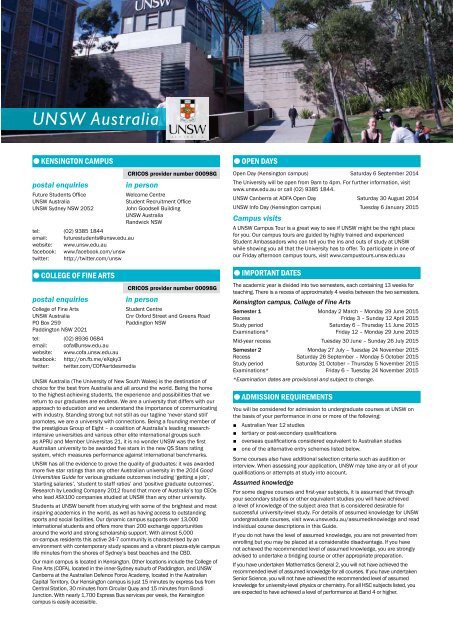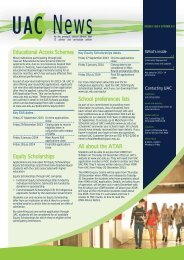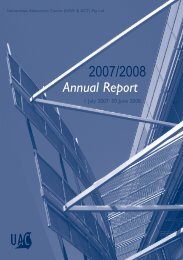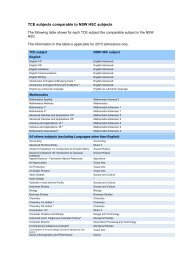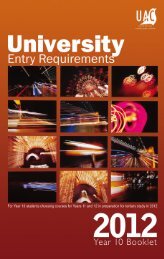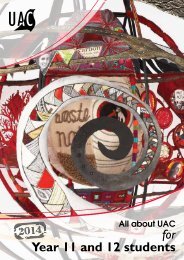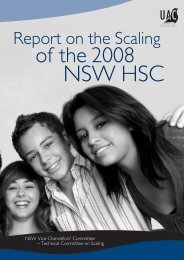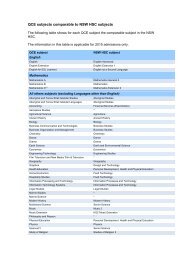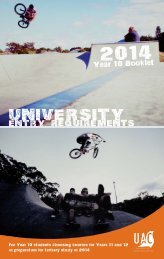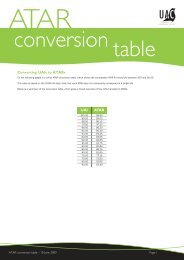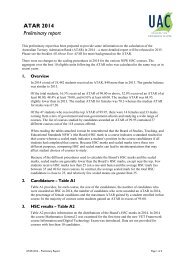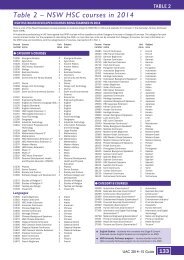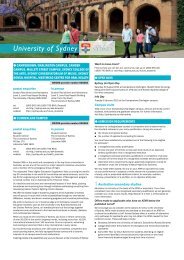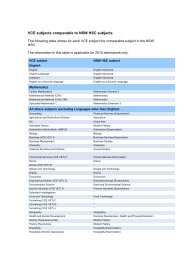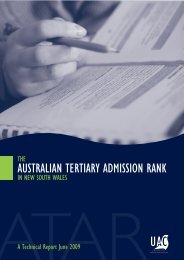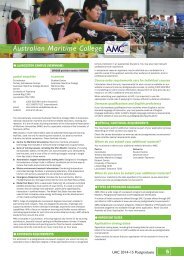University of New South Wales - Universities Admissions Centre
University of New South Wales - Universities Admissions Centre
University of New South Wales - Universities Admissions Centre
Create successful ePaper yourself
Turn your PDF publications into a flip-book with our unique Google optimized e-Paper software.
UNSW Australia<br />
QQKensington Campus<br />
postal enquiries<br />
Future Students Office<br />
UNSW Australia<br />
UNSW Sydney NSW 2052<br />
tel: (02) 9385 1844<br />
email: futurestudents@unsw.edu.au<br />
website: www.unsw.edu.au<br />
facebook: www.facebook.com/unsw<br />
twitter: http://twitter.com/unsw<br />
QQCollege <strong>of</strong> Fine Arts<br />
postal enquiries<br />
College <strong>of</strong> Fine Arts<br />
UNSW Australia<br />
PO Box 259<br />
Paddington NSW 2021<br />
tel: (02) 8936 0684<br />
email: c<strong>of</strong>a@unsw.edu.au<br />
website: www.c<strong>of</strong>a.unsw.edu.au<br />
facebook: http://on.fb.me/eXqky3<br />
twitter: twitter.com/COFAartdesmedia<br />
CRICOS provider number 00098G<br />
in person<br />
Welcome <strong>Centre</strong><br />
Student Recruitment Office<br />
John Goodsell Building<br />
UNSW Australia<br />
Randwick NSW<br />
CRICOS provider number 00098G<br />
in person<br />
Student <strong>Centre</strong><br />
Cnr Oxford Street and Greens Road<br />
Paddington NSW<br />
UNSW Australia (The <strong>University</strong> <strong>of</strong> <strong>New</strong> <strong>South</strong> <strong>Wales</strong>) is the destination <strong>of</strong><br />
choice for the best from Australia and all around the world. Being the home<br />
to the highest-achieving students, the experience and possibilities that we<br />
return to our graduates are endless. We are a university that differs with our<br />
approach to education and we understand the importance <strong>of</strong> communicating<br />
with industry. Standing strong but not still as our tagline ‘never stand still’<br />
promotes, we are a university with connections. Being a founding member <strong>of</strong><br />
the prestigious Group <strong>of</strong> Eight – a coalition <strong>of</strong> Australia’s leading researchintensive<br />
universities and various other elite international groups such<br />
as APRU and Member Universitas 21, it is no wonder UNSW was the first<br />
Australian university to be awarded five stars in the new QS Stars rating<br />
system, which measures performance against international benchmarks.<br />
UNSW has all the evidence to prove the quality <strong>of</strong> graduates: it was awarded<br />
more five star ratings than any other Australian university in the 2014 Good<br />
<strong>Universities</strong> Guide for various graduate outcomes including ‘getting a job’,<br />
‘starting salaries’, ‘student to staff ratios’ and ‘positive graduate outcomes’.<br />
Research by Leading Company 2012 found that more <strong>of</strong> Australia’s top CEOs<br />
who lead ASX100 companies studied at UNSW than any other university.<br />
Students at UNSW benefit from studying with some <strong>of</strong> the brightest and most<br />
inspiring academics in the world, as well as having access to outstanding<br />
sports and social facilities. Our dynamic campus supports over 13,000<br />
international students and <strong>of</strong>fers more than 200 exchange opportunities<br />
around the world and strong scholarship support. With almost 5,000<br />
on-campus residents this active 24-7 community is characterised by an<br />
environment with contemporary study spaces and a vibrant piazza-style campus<br />
life minutes from the shores <strong>of</strong> Sydney’s best beaches and the CBD.<br />
Our main campus is located in Kensington. Other locations include the College <strong>of</strong><br />
Fine Arts (COFA), located in the inner-Sydney suburb <strong>of</strong> Paddington, and UNSW<br />
Canberra at the Australian Defence Force Academy, located in the Australian<br />
Capital Territory. Our Kensington campus is just 15 minutes by express bus from<br />
Central Station, 30 minutes from Circular Quay and 15 minutes from Bondi<br />
Junction. With nearly 1,700 Express Bus services per week, the Kensington<br />
campus is easily accessible.<br />
QQOPEN DAYS<br />
Open Day (Kensington campus) Saturday 6 September 2014<br />
The <strong>University</strong> will be open from 9am to 4pm. For further information, visit<br />
www.unsw.edu.au or call (02) 9385 1844.<br />
UNSW Canberra at ADFA Open Day Saturday 30 August 2014<br />
UNSW Info Day (Kensington campus) Tuesday 6 January 2015<br />
Campus visits<br />
A UNSW Campus Tour is a great way to see if UNSW might be the right place<br />
for you. Our campus tours are guided by highly trained and experienced<br />
Student Ambassadors who can tell you the ins and outs <strong>of</strong> study at UNSW<br />
while showing you all that the <strong>University</strong> has to <strong>of</strong>fer. To participate in one <strong>of</strong><br />
our Friday afternoon campus tours, visit www.campustours.unsw.edu.au<br />
QQIMPORTANT DATES<br />
The academic year is divided into two semesters, each containing 13 weeks for<br />
teaching. There is a recess <strong>of</strong> approximately 4 weeks between the two semesters.<br />
Kensington campus, College <strong>of</strong> Fine Arts<br />
Semester 1 Monday 2 March – Monday 29 June 2015<br />
Recess Friday 3 – Sunday 12 April 2015<br />
Study period Saturday 6 – Thursday 11 June 2015<br />
Examinations* Friday 12 – Monday 29 June 2015<br />
Mid-year recess Tuesday 30 June – Sunday 26 July 2015<br />
Semester 2 Monday 27 July – Tuesday 24 November 2015<br />
Recess Saturday 26 September – Monday 5 October 2015<br />
Study period Saturday 31 October – Thursday 5 November 2015<br />
Examinations* Friday 6 – Tuesday 24 November 2015<br />
*Examination dates are provisional and subject to change.<br />
QQADMISSION REQUIREMENTS<br />
You will be considered for admission to undergraduate courses at UNSW on<br />
the basis <strong>of</strong> your performance in one or more <strong>of</strong> the following:<br />
■■<br />
Australian Year 12 studies<br />
■■<br />
tertiary or post-secondary qualifications<br />
■■<br />
overseas qualifications considered equivalent to Australian studies<br />
■■<br />
one <strong>of</strong> the alternative entry schemes listed below.<br />
Some courses also have additional selection criteria such as audition or<br />
interview. When assessing your application, UNSW may take any or all <strong>of</strong> your<br />
qualifications or attempts at study into account.<br />
Assumed knowledge<br />
For some degree courses and first-year subjects, it is assumed that through<br />
your secondary studies or other equivalent studies you will have achieved<br />
a level <strong>of</strong> knowledge <strong>of</strong> the subject area that is considered desirable for<br />
successful university-level study. For details <strong>of</strong> assumed knowledge for UNSW<br />
undergraduate courses, visit www.unsw.edu.au/assumedknowledge and read<br />
individual course descriptions in this Guide.<br />
If you do not have the level <strong>of</strong> assumed knowledge, you are not prevented from<br />
enrolling but you may be placed at a considerable disadvantage. If you have<br />
not achieved the recommended level <strong>of</strong> assumed knowledge, you are strongly<br />
advised to undertake a bridging course or other appropriate preparation.<br />
If you have undertaken Mathematics General 2, you will not have achieved the<br />
recommended level <strong>of</strong> assumed knowledge for all courses. If you have undertaken<br />
Senior Science, you will not have achieved the recommended level <strong>of</strong> assumed<br />
knowledge for university-level physics or chemistry. For all HSC subjects listed, you<br />
are expected to have achieved a level <strong>of</strong> performance at Band 4 or higher.
1 Australian secondary studies<br />
Admission to all undergraduate courses at the <strong>University</strong> is subject to<br />
selection on the basis <strong>of</strong> the ATAR or equivalent.<br />
Offers made to applicants who have an ATAR below the<br />
published cut-<strong>of</strong>f<br />
UNSW has a number <strong>of</strong> admission schemes that may allow 2014 NSW and<br />
ACT Year 12 applicants to receive an <strong>of</strong>fer to a course even though they have<br />
an ATAR below the published cut-<strong>of</strong>f. They include:<br />
■■<br />
Academic Achievement Award Scholars<br />
■■<br />
Australian Aboriginal and Torres Strait Islander <strong>Admissions</strong> Scheme<br />
■■<br />
Bachelor <strong>of</strong> Interior Architecture Alternative Admission Scheme (BIAAS)<br />
■■<br />
Business Information Systems Admission Scheme (BISAS)<br />
■■<br />
COFA Portfolio Entry<br />
■■<br />
Educational Access Scheme – ACCESS Scheme<br />
■■<br />
Elite Athletes and Performers Program<br />
■■<br />
Faculty <strong>of</strong> Engineering Admission Scheme (FEAS)<br />
■■<br />
HSC Plus.<br />
For details, read the relevant sections on the following pages.<br />
Academic Achievement Awards<br />
The Academic Achievement Awards (AAA) are provided to encourage<br />
academically gifted Year 12 students from eligible NSW and ACT high schools<br />
to undertake undergraduate study at UNSW. As well as a $4,000 (tax exempt)<br />
one-<strong>of</strong>f payment, three bonus points will be awarded for all UNSW preferences,<br />
except Medicine and Co-op Programs. The process for AAA selection is under<br />
review and updated information will be made available to schools at a later<br />
date. Visit www.scholarships.unsw.edu.au for further information.<br />
Elite Athletes and Performers Program<br />
The Elite Athletes and Performers (EAP) Program supports students with a<br />
flexible entry process that considers both academic and elite achievements<br />
and recognises these by awarding bonus points. UNSW also <strong>of</strong>fers flexible<br />
study arrangements and support for elite athletes and performers who wish to<br />
continue their elite commitments while studying at UNSW. The EAP Program<br />
awards up to five bonus points to high school leavers who have excelled in<br />
areas <strong>of</strong> sport, academia, leadership, and/or music at an elite level. EAP<br />
Bonus Points are not available for admission to Medicine or Co-op Programs.<br />
For full details <strong>of</strong> the program, visit www.unsw.edu.au/eap<br />
HSC Plus<br />
HSC Plus is a program <strong>of</strong> rewarding, by means <strong>of</strong> a bonus points system,<br />
performance in Australian Year 12 subjects relevant to UNSW undergraduate<br />
programs. This is in recognition <strong>of</strong> the strong correlation between Year 12<br />
subject performance and preparation for, and success in, first year university<br />
studies. Students who have undertaken and done well in relevant Year 12<br />
subjects are generally well prepared for the demands <strong>of</strong> university study.<br />
A successful first year <strong>of</strong> university study lays the foundation for a successful<br />
and rewarding UNSW experience. By employing strategies that enhance the<br />
academic achievement <strong>of</strong> UNSW students we also improve their employability<br />
and increase the range <strong>of</strong> career options for our graduates.<br />
For full details <strong>of</strong> HSC Plus, visit www.unsw.edu.au/hscplus<br />
2 Australian tertiary studies<br />
If you hold a completed AQF Advanced Diploma, Diploma, Associate Diploma<br />
or Certificate IV or equivalent, you are eligible to be considered for admission.<br />
Trade certificates are not considered. If you have undertaken at least threequarters<br />
<strong>of</strong> a standard full-time study load – 0.75 Full Time Equivalent (FTE)<br />
– <strong>of</strong> degree-level studies in a course at an approved university, your tertiary<br />
studies will be taken into account.<br />
Special Consideration for Applicants with Tertiary Studies (SCATS)<br />
Exclusion/Suspension: If you have been excluded or suspended from UNSW<br />
or another tertiary institution, UNSW will not consider you for admission<br />
unless you provide evidence <strong>of</strong> academic rehabilitation (eg by subsequently<br />
successfully completing one semester <strong>of</strong> university study or one year <strong>of</strong> study<br />
at AQF Certificate IV level or above). You must also submit a SCATS application<br />
to explain the circumstances surrounding your suspension/exclusion and<br />
outline why you consider you will now succeed in your course.<br />
Educational disadvantage: If you are applying to the <strong>University</strong> with tertiary<br />
qualifications (either from UNSW or another institution) and have experienced<br />
long-term educational disadvantage which has affected your tertiary and/or<br />
secondary academic performance, you may have your circumstances taken<br />
into account. Circumstances that may be considered include severe personal<br />
or family illness/disability and other circumstances beyond your control. You<br />
must submit a written statement describing these circumstances, provide<br />
documentation to support your claims and submit a SCATS application.<br />
SCATS applications are available at www.unsw.edu.au/scats. Return your<br />
application to the UNSW <strong>Admissions</strong> Office by Friday 28 November 2014 for<br />
admission in semester 1 or by Friday 5 June 2015 for admission in semester<br />
2. Late applications will not be accepted.<br />
3 Overseas qualifications<br />
Australian citizens or permanent residents <strong>of</strong> Australia with overseas qualifications<br />
must meet UNSW’s English pr<strong>of</strong>iciency standards. Refer to Table 7 in Part 1<br />
for information on commonly accepted overseas secondary qualifications.<br />
If you hold overseas secondary or tertiary qualifications from countries where<br />
English is not the sole language <strong>of</strong> instruction and assessment, you must<br />
provide evidence <strong>of</strong> English language pr<strong>of</strong>iciency – read page 19 in Part 1 and<br />
visit UAC’s website at www.uac.edu.au/undergraduate/faq/elp.shtml<br />
4 Alternative entry<br />
If you do not hold qualifications that allow you to compete for university<br />
entrance, you may seek admission to the <strong>University</strong> on the basis <strong>of</strong> your<br />
performance in one <strong>of</strong> the following programs:<br />
Special Tertiary <strong>Admissions</strong> Test<br />
If you will be at least 21 years <strong>of</strong> age on Sunday 1 March 2015, you may<br />
qualify for admission to UNSW by undertaking the Special Tertiary <strong>Admissions</strong><br />
Test (STAT). Your STAT results may be accepted for admission to 422000<br />
B Arts and 429000 B Science.<br />
<strong>University</strong> Preparation Program<br />
If you will be at least 21 years <strong>of</strong> age on Sunday 1 March 2015, you may<br />
qualify for admission to UNSW on the basis <strong>of</strong> your performance in the<br />
<strong>University</strong> Preparation Program (UPP). The UPP provides an avenue <strong>of</strong> entry to<br />
many courses at UNSW for people who do not hold qualifications that would<br />
allow them to compete for university entrance. It is specifically designed<br />
for older students who are seeking admission to an undergraduate degree<br />
course after a period away from formal study. For further details see 430200<br />
<strong>University</strong> Preparation Program on page 453 and visit www.unsw.edu.au/upp<br />
Tertiary Preparation Certificate<br />
If you will be at least 21 years <strong>of</strong> age on Sunday 1 March 2015 and have<br />
completed the Tertiary Preparation Certificate (TPC) conducted by TAFE, you<br />
will be considered for admission. The TPC is not accepted for admission to the<br />
Medicine degrees (428000) or 429750 B Optometry/B Science. If you hold a<br />
TPC and seek admission to a course with assumed knowledge in Mathematics,<br />
you should have completed Foundation Mathematics A and Calculus.<br />
Certificate in Matriculation – Reduced Program/Limited ATAR<br />
If you will be at least 21 years <strong>of</strong> age on Sunday 1 March 2015, you may<br />
qualify for admission to UNSW by undertaking five units <strong>of</strong> Board Developed<br />
courses, including English, at the 2014 NSW HSC examination. The Certificate<br />
in Matriculation is undertaken through TAFE. You must undertake no more than<br />
nine units. The Limited ATAR is not accepted for admission to the Medicine<br />
degrees (428000) or 429750 B Optometry/B Science. If you are eligible<br />
for a Limited ATAR, you are not required to make any special or additional<br />
applications unless the course you are applying for indicates otherwise.<br />
A Limited ATAR will be calculated automatically. For additional information on<br />
the Limited ATAR, read section 8.8 in Part 1. Refer also to course descriptions<br />
for details. Previous study may be taken into account – for further details call<br />
the UNSW <strong>Admissions</strong> Office on (02) 9385 3656.<br />
QQEDUCATIONAL ACCESS SCHEMES<br />
UNSW has an Educational Access Scheme (EAS), called the ACCESS Scheme,<br />
to assist students who have not undertaken university or other study at<br />
diploma level or above and who have experienced long-term educational<br />
disadvantage, with their educational performance affected by circumstances<br />
beyond their control during years 11 and/or 12 or equivalent.<br />
The scheme is available for entry to all undergraduate courses. Eligibility for the<br />
scheme does not guarantee admission but does allow successful applicants<br />
with an ATAR or equivalent below the course cut-<strong>of</strong>f to compete for a place.<br />
Read section 3.6 in Part 1 for more information on EAS.<br />
For further information about the scheme, visit www.unsw.edu.au/access<br />
QQEQUITY SCHOLARSHIPS<br />
UNSW <strong>of</strong>fers two types <strong>of</strong> Equity Scholarships: UNSW Equity Scholarships<br />
(commencing students) and Commonwealth Indigenous Scholarships, which<br />
are open to all eligible applicants applying to or enrolled at UNSW.<br />
You only have to submit one application to UAC to be considered for all Equity<br />
Scholarships for which you are eligible at UNSW. All UNSW Equity Scholarships<br />
applications are processed centrally through UAC. Read section 7.6 in Part 1 for<br />
more information on Equity Scholarships.<br />
For details on the wide range <strong>of</strong> scholarships that UNSW <strong>of</strong>fers, visit<br />
www.scholarships.unsw.edu.au or call UNSW Scholarships on (02) 9385 1078.
QQ<br />
ABORIGINAL AND TORRES STRAIT ISLANDER AUSTRALIANS<br />
UNSW provides alternative entry schemes and pathways for Aboriginal<br />
and Torres Strait Islander Australians. You can apply even if you have not<br />
completed school or achieved the required ATAR for entry into your preferred<br />
course <strong>of</strong> study. Applicants are assessed for admission based upon the<br />
quality <strong>of</strong> their applications, prior education and qualifications, work<br />
experience and an interview. Consideration is given to an applicant’s relevant<br />
life, work, educational and training experience as preparation for study.<br />
Residential preparatory programs are held in November/December for entry<br />
into Secondary Teacher Education, Business, Law, Medicine and Social Work.<br />
For all other programs, interviews are held in November/December.<br />
For further information, visit www.nuragili.unsw.edu.au, call Nura Gili on (02)<br />
9385 3805 or email asknuragili@unsw.edu.au.<br />
QQINTERNATIONAL FEE-PAYING APPLICANTS<br />
Some international fee-paying applicants apply through UAC; others apply<br />
direct to UNSW. Read sections 1.4 and 1.5 in Part 1 for more information on<br />
how to apply.<br />
Direct applications to UNSW close Sunday 30 November 2014 for admission<br />
in Semester 1 and Sunday 31 May 2015 for admission in Semester 2. For a<br />
prospectus and application information, visit www.international.unsw.edu.au<br />
QQBRIDGING COURSES<br />
UNSW bridging courses <strong>of</strong>fer students the opportunity to revise and extend<br />
their knowledge in chemistry, mathematics and physics subjects. The courses<br />
are conducted in late January/February and are completed before the start <strong>of</strong><br />
Semester 1.<br />
The Chemistry Bridging Course <strong>of</strong>fers revision and supplements what<br />
students have already covered in the HSC syllabus to bring knowledge up to<br />
required tertiary level. It also provides a suitable introduction to students who<br />
have not studied chemistry before.<br />
The Mathematics Bridging Course is designed for students who wish to<br />
enrol in courses that assume a level <strong>of</strong> understanding in HSC Mathematics<br />
Extension 1. The course is recommended for students who have undertaken<br />
Mathematics.<br />
The Physics Bridging Course provides a comprehensive revision <strong>of</strong> physics<br />
based on the HSC syllabus and introduces the subject to students who have<br />
not studied it before.<br />
Visit www.science.unsw.edu.au/bridging for further information.<br />
QQCOURSES AVAILABLE BY DIRECT APPLICATION<br />
Honours programs<br />
Applications for graduates/graduands <strong>of</strong> other universities or previous<br />
students <strong>of</strong> UNSW close Wednesday 10 December 2014 for admission in<br />
semester 1 and Sunday 10 May 2015 for admission in semester 2. Honours<br />
application forms are available at www.unsw.edu.au/honours<br />
QQDISTANCE EDUCATION<br />
UNSW does not <strong>of</strong>fer any undergraduate programs by distance education.<br />
QQENROLMENT<br />
Acceptance <strong>of</strong> <strong>of</strong>fer<br />
You will receive details <strong>of</strong> enrolment procedures with your UAC <strong>of</strong>fer. Failure<br />
to follow the outlined procedures may result in your <strong>of</strong>fer lapsing. Main Round<br />
<strong>of</strong>fers must be accepted by late January 2015 for semester 1. Offers for<br />
semester 2 must be accepted by late June. You will be required to accept your<br />
<strong>of</strong>fer and enrol online. Full details regarding enrolment will be available in<br />
early January on UNSW’s website at www.gettingstarted.unsw.edu.au<br />
Advanced standing/Academic credit<br />
If you have already completed some tertiary study, you may be entitled to credit<br />
for relevant subjects or for entry to the second or later year <strong>of</strong> a course. The<br />
<strong>University</strong> does not determine credit until an <strong>of</strong>fer <strong>of</strong> admission has been made<br />
and accepted. For general advice about credit, contact the school <strong>of</strong>fice <strong>of</strong> the<br />
course to which you are applying and visit http://credittransfer.unsw.edu.au<br />
Fees and charges<br />
All students except those undertaking an enabling course or enrolled at UNSW<br />
Canberra must pay a student contribution for a Commonwealth-supported<br />
place (CSP); read section 7 in Part 1.<br />
QQFINANCIAL ASSISTANCE<br />
Youth and student allowance<br />
For details on Youth Allowance, Austudy and ABSTUDY, read section 7 in Part 1.<br />
Scholarships<br />
Scholarships@UNSW<br />
Over 2,000 students each year are <strong>of</strong>fered scholarships at UNSW. Our wide<br />
range <strong>of</strong> scholarships recognise the special skills, talents and needs <strong>of</strong> UNSW<br />
students. Following are some <strong>of</strong> the areas we <strong>of</strong>fer scholarships in:<br />
■■<br />
■■<br />
■■<br />
General Scholarships<br />
– academic merit<br />
– sporting ability<br />
– rural and Indigenous students<br />
– students relocating<br />
– students with disabilities<br />
Equity Scholarships<br />
– to help students who need financial assistance to study at university<br />
Faculty Scholarships<br />
– for students who want to study specific programs.<br />
Scholarships at UNSW are online<br />
Our website www.scholarships.unsw.edu.au provides easy access to all the<br />
information you need on each <strong>of</strong> our scholarships. The site allows you to search<br />
and apply for scholarships, and monitor the progress <strong>of</strong> your application.<br />
When should Year 12 applicants apply for scholarships<br />
Scholarships for 2015 open in June 2014 and close on Tuesday 30<br />
September 2014.<br />
UNSW Co-op Program<br />
$16,750 pa (tax free) for 4 years (minimum)<br />
Applications for Co-op scholarships are made online at www.co-op.unsw.edu.au;<br />
they open in May and close on Tuesday 30 September 2014. Interviews<br />
will be held at UNSW on 24–25 November 2014 and students MUST make<br />
themselves available to attend the <strong>University</strong> for scheduled interviews.<br />
The UNSW Co-op Program is a ‘Career Development’ scholarship program<br />
set up by industry and UNSW to provide pr<strong>of</strong>essional development, industry<br />
training, mentoring and networking and financial support for selected<br />
undergraduate students in the specific disciplines <strong>of</strong> Business, Engineering<br />
and Science. It includes nine to 18 months <strong>of</strong> industry training with multiple<br />
companies and, unlike cadetships, Co-op scholars are not bonded at the end<br />
<strong>of</strong> their program. Students must maintain required performance standards<br />
throughout their degree and the industry training placements.<br />
For more details on the program, talk to your school’s careers adviser, visit<br />
www.co-op.unsw.edu.au or contact the UNSW Co-op Program by calling (02)<br />
9385 5116 or emailing cooprog@unsw.edu.au.<br />
The academic requirement for entry to the Co-op Program is a minimum ATAR<br />
<strong>of</strong> 96.00 or equivalent or entry into the specific degree program, whichever<br />
is the higher. No bonus points (other than EAS) will be considered for this<br />
requirement. As predicted ATARs are not always accurate, we recommend that<br />
students expecting an ATAR above 90.00 should consider applying. In addition<br />
to academic merit, applicants are also selected as Co-op scholars on the<br />
basis <strong>of</strong> their personal skills, leadership potential and motivation, as well as<br />
their non-academic achievements.<br />
QQACCOMMODATION<br />
UNSW Colleges<br />
The UNSW Colleges comprises four colleges that are fully owned and<br />
operated by the <strong>University</strong>. All but UNSW Hall are brand new, having opened<br />
in January 2014, and provide single-occupancy rooms with king single beds<br />
and study area, shared study spaces and recreation rooms on each floor,<br />
ro<strong>of</strong>top gardens, expansive common areas and laundry facilities. Each college<br />
<strong>of</strong>fers a distinctive and unique experience, combining a strong support<br />
network delivered through an established residential care program as well as<br />
academic mentoring.<br />
The Kensington Colleges provide single-occupancy rooms with a choice <strong>of</strong><br />
rooms with ensuite or shared unisex bathroom. Wi-fi and all utilities, regular<br />
room cleaning and all meals are included in the fees.<br />
Fig Tree Hall provides single-occupancy rooms with ensuites. Students live on<br />
segregated floors, alcohol is not permitted, Wi-fi and all utilities, regular room<br />
cleaning and all meals (including halal options) are included in the fees.<br />
Colombo House provides single-occupancy rooms with ensuites, is selfcatered<br />
with a separate lockable pantry, fridge and freezer space for each<br />
student. Wi-fi and all utilities are included in the fees.
UNSW Hall is older style accommodation with shared unisex bathrooms.<br />
The college provides single or twin share accommodation, shared study spaces<br />
and recreation rooms, barbecue area and laundry facilities. Internet and all<br />
utilities, regular room cleaning, breakfast and dinner are included in the fees.<br />
Applications for entry for 2015 should be made at www.rc.unsw.edu.au.<br />
A personal interview may be required as part <strong>of</strong> the selection procedure.<br />
Places in colleges are very competitive and you are advised to apply early.<br />
UNSW Apartments<br />
UNSW provides 52 week occupancy, independent, apartment-style<br />
accommodation for a range <strong>of</strong> student requirements, including undergraduates,<br />
postgraduates, couples and families with children. All apartments include<br />
internet, utility costs and are located both on and close to campus. For<br />
information, visit www.rc.unsw.edu.au<br />
QQSTUDENT AND CAMPUS SERVICES<br />
Careers and appointments<br />
Careers and Employment <strong>of</strong>fers a range <strong>of</strong> services to assist students to<br />
develop career management skills and gain employment. Visit Careers and<br />
Employment, Level 2, East Wing, Quadrangle Building, email<br />
careers@unsw.edu.au or visit www.careers.unsw.edu.au<br />
Chaplaincy<br />
The Religious <strong>Centre</strong> is attended by representatives <strong>of</strong> the Anglican, Buddhist,<br />
Catholic, Coptic Orthodox, Greek Orthodox, Hillsong, Islamic, Jewish,<br />
Presbyterian and Uniting Church faiths. Full-time and part-time chaplains<br />
conduct worship services, lead Bible Studies, hold prayer meetings and <strong>of</strong>fer<br />
spiritual counselling. There is also a Jewish Chaplain at the <strong>Centre</strong>.<br />
The Islamic Society has an Imam in attendance with meeting and prayer<br />
rooms available for Muslim students. The Buddhist student group, ‘Unibuds’,<br />
also has facilities in the <strong>Centre</strong>.<br />
Childcare<br />
There are a number <strong>of</strong> childcare centres located on or near the Kensington campus.<br />
For information on all childcare options, visit www.earlyyears.unsw.edu.au<br />
Counselling<br />
Counselling and Psychological Services (CAPS) provides free and confidential<br />
psychologically focused strategies to UNSW students. UNSW counsellors are<br />
registered psychologists who understand the needs <strong>of</strong> students enrolled in<br />
higher education. For further information, visit www.counselling.unsw.edu.au<br />
As an alternative to counselling, students can talk with a Student Participation<br />
Advisor who has many years <strong>of</strong> experience in guiding students through<br />
general study and personal matters to achieve their academic goals. For more<br />
information or to make an appointment, visit https://student.unsw.edu.au/<br />
student-participation-advisors<br />
Exchange programs<br />
UNSW has exchange agreements with more than 200 universities in over<br />
35 countries. UNSW encourages students to undertake part <strong>of</strong> their degree<br />
overseas. Scholarships are available. For further information, visit<br />
www.international.unsw.edu.au/exchange<br />
Health services<br />
The <strong>University</strong> Health Service is a complete general medical practice situated<br />
on the Kensington campus. A private dental surgery is also available.<br />
Learning assistance<br />
The Learning <strong>Centre</strong> assists students with study-related issues such as<br />
academic writing, examination techniques, oral presentation skills and<br />
effective time management. The service is free and confidential. For further<br />
information, visit www.lc.unsw.edu.au<br />
Library/Computing services<br />
UNSW’s Main Library at Kensington <strong>of</strong>fers access to a wide range <strong>of</strong><br />
materials, both print and online, in the fields <strong>of</strong> Arts and Social Sciences, Built<br />
Environment, Business, Engineering, Medicine and Science. The Law Library<br />
is also located on the Kensington campus and there is a specialist art, design<br />
and media arts library on the COFA campus. For further information, visit<br />
www.library.unsw.edu.au<br />
UNSW students are provided with access to various electronic services<br />
including email, remote access via modem to the <strong>University</strong> Network and the<br />
internet. For further information, visit www.its.unsw.edu.au<br />
Orientation<br />
An easy step-by-step guide to enrolling, familiarising yourself with UNSW and<br />
settling in is available from mid January. <strong>New</strong> and returning students should come<br />
along and get involved in the Orientation Week (O Week) celebrations held on<br />
campus from Monday 23 February to Friday 27 February 2015. O Week has a<br />
wealth <strong>of</strong> clubs and societies, as well as services that can assist you during your<br />
studies. For further information, visit www.gettingstarted.unsw.edu.au<br />
Sport and recreation<br />
UNSW Sport and Recreation has some <strong>of</strong> the best sport and recreation<br />
facilities <strong>of</strong> any Australian university and provides a comprehensive range <strong>of</strong><br />
health, fitness and sporting facilities. For further information, visit<br />
www.sportandrec.unsw.edu.au<br />
Student organisations<br />
Covering the Kensington, COFA and Canberra campuses, Arc@UNSW is the student<br />
organisation for all students at the <strong>University</strong>. With a majority <strong>of</strong> students on its<br />
governing board and student-run activities and programs such as clubs, societies,<br />
parties and entertainment Arc is located in the Blockhouse (ground floor) and<br />
Roundhouse (first floor) at Kensington and in D Block at the COFA campus. For<br />
further information, drop by, call (02) 9385 7700 or visit arc.unsw.edu.au<br />
Students with disabilities<br />
We are committed to help ensure all students can participate equally in the<br />
educational opportunities <strong>of</strong>fered by UNSW. We provide a range <strong>of</strong> services<br />
for students with disabilities or medical conditions. These include note takers,<br />
readers or sign interpreters, exam support, library provisions and resource<br />
material. Contact an Equity Officer (Disability) as soon as you can to discuss<br />
your support needs. Call (02) 9385 4734, email seadu@unsw.edu.au or visit<br />
www.studentequity.unsw.edu.au<br />
QQFURTHER INFORMATION<br />
For more detailed information, see www.unsw.edu.au or contact the Future<br />
Students Office. Call (02) 9385 1844/1866 or email futurestudents@unsw.edu.au.<br />
The online handbook is available at www.handbook.unsw.edu.au


